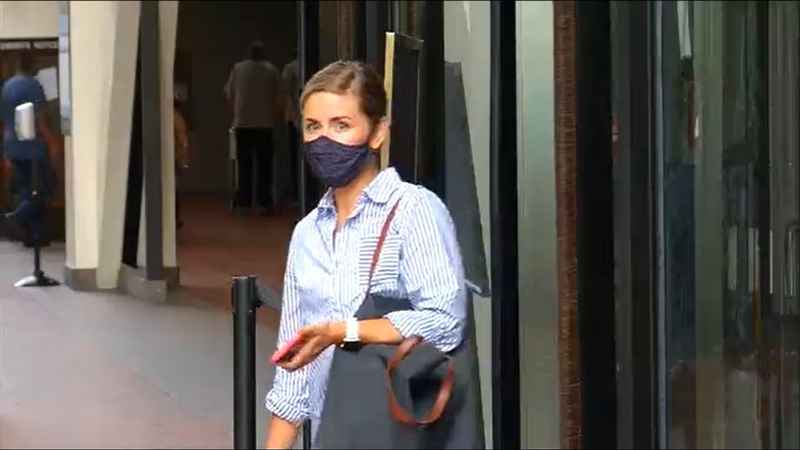Are cloth masks effective against the delta variant? Experts say any mask is better than no mask
[anvplayer video=”5048223″ station=”998122″]
In this delta variant summer, Joan Rohde is masking up — again.
"Delta came and we have a grandson now who’s 4 months old, and we want to protect him," Rohde, from North Oaks, says. "Actually the other day last week, I was thinking what am I going to do with all these masks? And it was a couple of weeks ago, and then this started, so I have enough masks."
Rohde says the delta variant spread — and the mask mandate inside some public buildings — prompted her to act.
Willy van Dooijeweert, the owner of the Urban Traveler Luggage store in Roseville, began selling face masks at the start of the pandemic. He says when the state mask mandate ended in May, his sales plummeted. But not anymore.
He says he’s sold about 1,000 masks over the last 10 days. About 20% of them are medical-grade N95 masks.

A woman wears a cloth mask while walking out of the Hennepin County Government Center on Wednesday, Aug. 4, 2021, in Minneapolis.[KSTP]
"When the delta variant started popping up and the CDC is talking about it, people started getting worried," van Dooijeweert said. "Worried that they may in fact themselves be infected with the delta variant, so they could infect others. So they want to protect themselves."
But what about all those cloth masks you’ve been stocking up for the past year? Are they effective against the delta variant?
5 EYEWITNESS NEWS asked Dr. Jill Foster, a University of Minnesota infectious disease physician and M Health Fairview employee.
"Yes, yes," she said. "Delta is … once it gets in, it causes much more severe disease. But it’s not like it’s a virus that when it’s on the outside of your body, it’s extra good at getting through the mask."
The Minnesota Department of Health says "the science on masks has not changed considerably since widespread use of masks was first recommended."
An MDH spokesperson provided a statement to 5 EYEWITNESS NEWS stating "since cloth masks are more readily and easily available for most people, and provide adequate protection for the wearer and those around them, MDH continues to align with CDC in recommending their use."
"I think a year ago, we didn’t know if masks on a large scale were going to work," Foster said. "I think at this point, we know that masks prevent you from having as big an exposure to the virus, as you would if you didn’t wear them."
Especially, she says, when coupled with the vaccine.
"I look at it kind of like it’s raining and you wear a raincoat, and the vaccine is like having an umbrella at the same time," Foster says.
She also suggests layering masks, such as a cloth with a disposable, especially in crowded situations.
How the mask fits, Foster says, is most important.
"An N95 is going to be the best mask as long as it fits nice and tightly to your face," she said. "What you want, you want to breathe through it better, than breathing around it. I see a lot of people wearing N95s. They’re kind of loose and hang off, and it kind of defeats the purpose."
The Centers for Disease Control and Prevention says masking is just part of a strategy to prevent the spread of COVID-19, including avoiding crowded indoor environments, utilizing social distancing, and isolation, quarantine and testing when appropriate. However, the agency says the most important element is getting the vaccine.
Rohde says she’s not a big fan of the mask but wants to keep her family safe.
"Do you feel confident about this, that the mask will protect you enough?" she was asked. "Sometimes I wear two masks," Rohde says. "I’ve read it’s 50% better to be masked up. So I’ll do whatever I can."